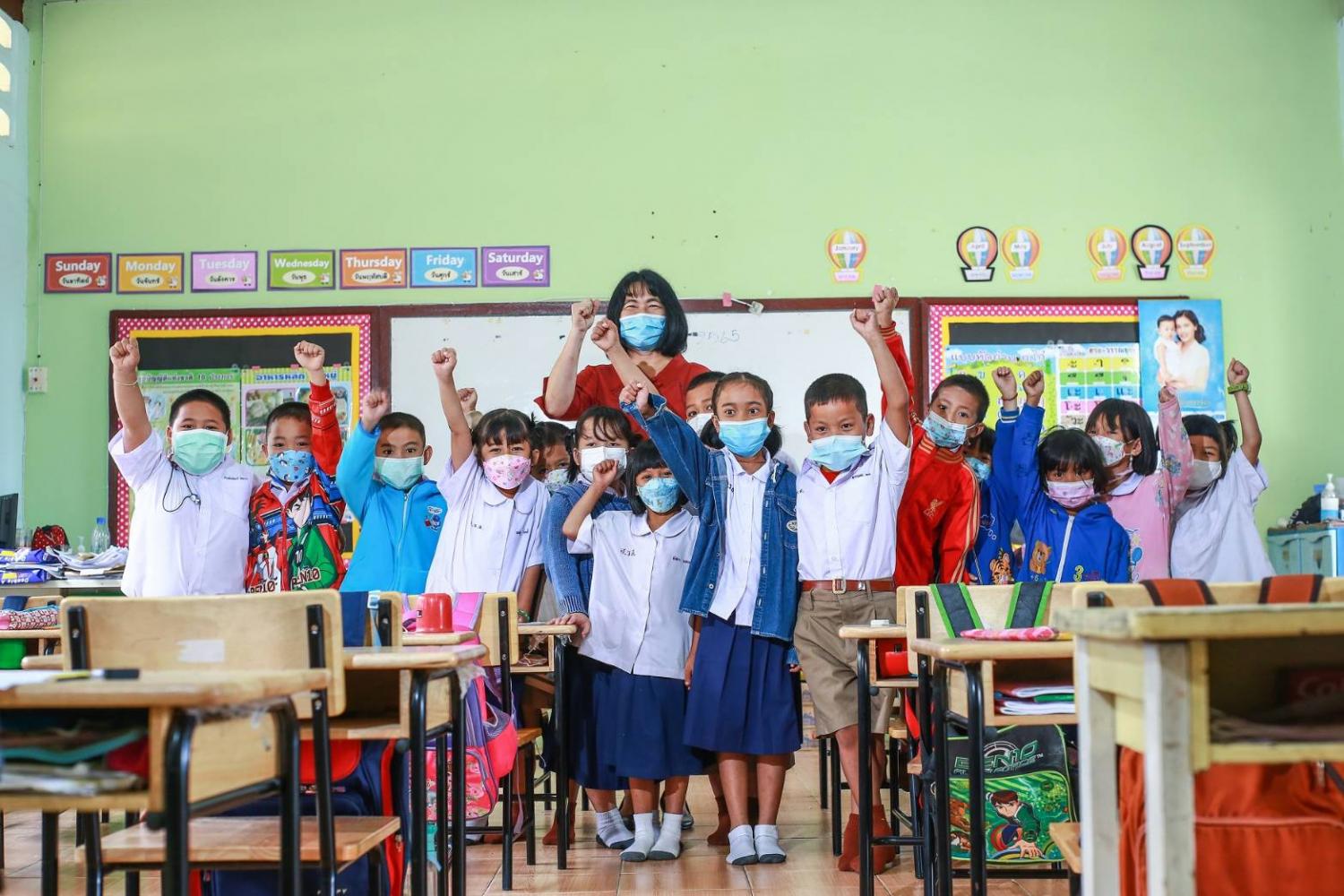
Bee Inthanon, 11, a fifth-grade student of Sin Rae Siam School in Ratchaburi's Suan Phueng district, knows all about hardship. For him, studying is a luxury -- second to putting bread on the table.
He and his brother live with their grandparents in a small wooden shack in a property where Bee's grandfather works. After school, or on his days off, Bee assists his grandmother as a cattle herder. Her salary was cut from 9,000 baht to 3,000 baht a month due to the pandemic.
"Poor people have to endure hardship. We live hand to mouth because of a lack of money. Those rich people can live comfortably because they have money," Bee said.
Bee skipped the first semester of school last year because he needed to help his family.
After his teacher reached out to his grandparents several times, he was finally allowed to return in the second semester in order to complete primary school, or grade six.
Located next to the Thai-Myanmar border, the school has 400 students from pre-school level to sixth grade. Many were born in low-income families while others live with broken families after their parents separated. Some parents leave their children with grandparents to find work in the city.
Panupong Munplai, the principal of Sin Rae Siam School, said he wants to help its students reach primary school level at least. Teachers join hands to create support programmes for students to reduce the chance of them dropping out, especially those from ethnic groups.
Mr Panupong said the school also teaches students to grow vegetables and raise hens for eggs, imbuing them with skills while putting them to use making lunch for their peers.
He said most of their parents are farmers or low-wage workers. Many lost their jobs during the pandemic and can no longer afford their children's education.
Tong is a sixth-grader who refuses to read aloud. He said he is not good at reading and prefers agricultural work and other recreational activities such as cooking.
"I'm graduating sixth grade this year but I don't have any money to enrol in middle school. I told my teachers and they said I would have a chance to study at Rujiraphat School next semester," he said.
"But my brain doesn't function well. I almost died when I was a baby. My mum told me she had been drinking alcohol almost every day when she was expecting me."
He said his parents are construction workers who like to get drunk after work. He hopes to secure a job when he grows up so he can take care of them. He still wants to go to school.
Covid dropouts
The Equitable Education Fund (EEF) found the number of poor students has increased as a result of Covid-19. It found there were 900,000 students living in very poor families as their parents earn less than 1,200 baht a month before the pandemic. That number then jumped to 1.2 million.
It also found that another 700,000 students live in poor families, meaning their parents make less than 3,000 baht per month, putting the tally of students at risk of dropping out as high as 1.9 million, said EEF manager Kraiyos Patrawart.
He said the riskiest periods are school breaks, especially for students moving from primary to middle schools or from middle to high-school level.
"This is because many families face financial difficulties. If their kids wish to pursue higher education, they need to pay tuition fees, travel and living expenses, which can be a real burden if the kids attend schools far from home," he said.
The EEF survey also showed that many primary school students upcountry decided to drop out to help support their families.
The poverty they face forces them to become informal workers even though they haven't reached working age, excluding them from state control and social security protection, he said.
The EEF then introduced a "Zero Dropout" campaign. It urges students to inform their schools if they need to study at a higher level. The EEF will work with both public and private sectors to offer financial aid to bring students back to school for the next semester, starting in May.
Waraporn Samkoset, president of the Independent Committee for Education Reform (ICER), said students who were left out of the education system usually have very little chance to come back and study.
"These children can barely overcome poverty. Many skip school to work with their parents. Many kids are left with no choice but to drop out. We need both the public and private sector to help provide educational opportunities so they can have a better life," she said.
Nurturing climate
Surain Thapanangkun, director of the Royal Project Foundation and the King's Recommended Supporting Centre at King Mongkut's University of Technology Thonburi, said the "Zero Dropout" campaign in Ratchaburi can be developed to help students across the country.
"But we need help from schools, communities and parents," Mr Surain said. The first step is asking students and schools what is needed to keep students in the system, he added.
Some schools may need skills their students can use in the labour market or to earn extra income while still studying. Others may need different curricula that fit their particular environment, such as farming knowledge.
Mr Surain said it is crucial to equip students with practical knowledge and skills. Educational inequality needs to be addressed by everyone involved, not just schools, he added.
Yanyong Charoensri, director of Ratchaburi Primary Education Office Area 1, said there is a need to raise awareness about students at risk of dropping out, while teaching parents to value the importance of education.
Local authorities will survey students to find out their problems and factors that force them to drop out, he said.
Schools need to put students into groups according to their problems and devise solutions that can be applied to each category.
"The final goal is to make sure students are happy with their studies and graduate."